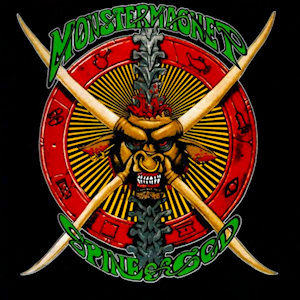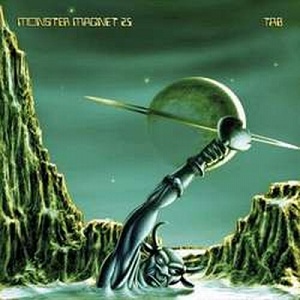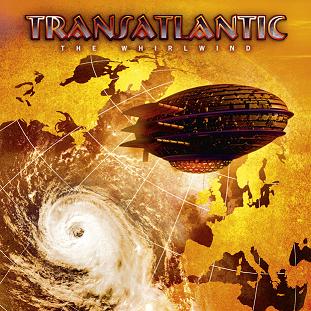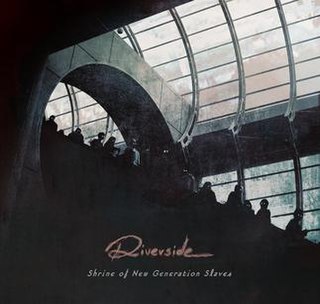
Captain Lockheed and the Starfighters is a 1974 satirical concept album by Robert Calvert, the former frontman of British space-rock band Hawkwind. It consists of a mixture of songs and comic spoken interludes.

Monster Magnet is an American rock band, founded in Red Bank, New Jersey in 1989 by Dave Wyndorf, John McBain (guitar) and Tim Cronin. The band has since gone through several lineup changes, leaving Wyndorf as the only constant member. Monster Magnet has released eleven studio albums to date, and are best known for their 1990s hits "Negasonic Teenage Warhead" and "Space Lord". The band has also been credited for developing and popularizing the stoner rock genre, along with Masters of Reality, Kyuss, Fu Manchu and Sleep.

Powertrip is the fourth studio album by American rock band Monster Magnet, released on June 16, 1998. The album was the band's commercial breakthrough, achieving mainstream success due largely to the hit single "Space Lord". Other hit songs on the album include "Powertrip", "Temple of Your Dreams", and "See You in Hell". The album itself, reached #1 on the Heatseekers Charts, #21 in the German Charts, #65 in the UK Charts, and #97 on the Billboard 200. The album was certified gold by the RIAA on January 25, 1999, and later went multi-platinum. Music videos were made for the songs "Space Lord", "Powertrip", and "See You in Hell".
Mando Diao is an alternative rock band from Borlänge, Sweden. The band got their breakthrough with the release of the album Hurricane Bar. Their main fan base is in Sweden, Germany, Austria, Switzerland and Japan. Band members are Björn Dixgård, Carl-Johan Fogelklou (bass), Daniel Haglund (keyboard) and Patrik Heinkipieti (drums).

David Gilmour is the debut solo studio album by Pink Floyd guitarist and co-lead vocalist David Gilmour, released on 26 May 1978. The album reached number 17 in the UK and number 29 on the Billboard US album charts; it was certified Gold in the US by the RIAA. The album was produced by Gilmour, and consists mostly of blues and guitar-oriented rock songs, except for the piano-dominated ballad "So Far Away".

Dopes to Infinity is the third album by American rock band Monster Magnet, released on March 21, 1995. The album includes the song "Negasonic Teenage Warhead", the band's first hit single.

Spine of God is the debut studio album by American rock band Monster Magnet, released in Europe in 1991 and in the United States the following year. The album represents one of the earliest examples of the emerging 1990s sub-genre of stoner rock. Spine of God did not perform well commercially upon its initial release, but was praised by critics and would later be considered a major influence on stoner rock bands. The song "Medicine" was released as a single with accompanying music video.

Superjudge is the second full-length album by American rock band Monster Magnet, released on April 6, 1993. It is the first Monster Magnet album to feature lead guitarist Ed Mundell, who replaced founding member John McBain in 1992. The album was not a commercial success upon release, but would later become an influential release in the stoner rock genre alongside the band's debut album, Spine of God. The tracks "Twin Earth" and "Face Down" were released as singles with accompanying music videos.

Figure Number Five is the fifth studio album by Swedish melodic death metal band Soilwork. The record was released on 22 April 2003 through Nuclear Blast label. On this release, the band introduces more elements of alternative metal into their melodic death metal style. This would be the last album with Henry Ranta on drums before he left the band after its release.

David Albert Wyndorf is an American musician, best known as the lead vocalist and rhythm guitarist of hard rock band Monster Magnet. He is the band's frontman, songwriter and only remaining founding member. Monster Magnet has released eleven studio albums and is considered one of the pioneers of the stoner rock genre. Prior to forming Monster Magnet, Wyndorf was the frontman of punk band Shrapnel.

Tab is the second EP by American rock band Monster Magnet, released in 1991. Initially released only in Europe, it was recorded before the band's 1991 debut full-length album Spine of God and was not released in North America until after the group's 1993 album Superjudge became a minor hit. The EP is generally viewed as Monster Magnet's most psychedelic release, with the first two tracks alone totaling almost 45 minutes.

God Says No is the fifth studio album by American rock band Monster Magnet. It was released in the United Kingdom on November 12, 2000, and in the United States on April 10, 2001. It was a commercial failure compared to their previous album, Powertrip. It was their last release recorded for A&M Records, due to problems with promotion of the album but it reached #17 in Germany. It would also be the last release with bassist Joe Calandra and drummer Jon Kleiman.

4-Way Diablo is the seventh studio album by American rock band Monster Magnet, released in November 2007. The album was recorded between 2006 and 2007, following frontman Dave Wyndorf's overdose on anxiolytics in February 2006. 4-Way Diablo sold 1,800 copies on its first week of release in the United States and is the band's first album since Dopes to Infinity (1995) to not feature guitarist Phil Caivano.

"Space Lord" is a 1998 single by American rock band Monster Magnet from the album Powertrip. The song is in the key of C minor. It brought them mainstream success, with its accompanying music video directed by Joseph Kahn. The song peaked at number three on the Billboard Mainstream Rock Songs chart, and number twenty-nine on the Billboard Alternative Songs chart. A remixed version of the song was also made, and was featured on their compilation album Greatest Hits. The music video is notable for being the first video ever aired on MTV's Total Request Live on September 14, 1998. It appeared on the countdown five times climbing no higher than the No. 7 position.

The Whirlwind is the third studio album by the supergroup Transatlantic, released on October 23, 2009. It is available in three formats: a standard edition, a double disc special edition and a deluxe edition with a 105-minute making-of DVD.

"Du Willst Mir An Die Wäsche" is a song by German alternative band Jennifer Rostock, and was released as the lead single from their second studio album Der Film on June 26, 2009. The song has peaked at #34 of the German Singles Chart and at #44 of the Austrian Singles Chart. The song was written by Jennifer Weist and Johannes Walter and produced by Werner Krumme and Christian Bader.

Mastermind is the eighth studio album by American rock band Monster Magnet, released on October 25, 2010. It debuted at No. 165 on the Billboard 200 selling around 3,000 copies, becoming the band's first album since 2001's God Says No to chart on the Billboard 200. Mastermind was the final album to feature long-time lead guitarist Ed Mundell and bassist Jim Baglino. The album marked the return of guitarist Phil Caivano after his four-year hiatus. A video for the first single, "Gods and Punks", was released on October 1, 2010.

Shrine of New Generation Slaves is the fifth studio album by Polish progressive rock band Riverside. The album was released on 18 January 2013 in Poland, 21 January in the rest of Europe, and 5 February in the US. It is available in four different formats: digital, 1CD jewelcase, 2CDs mediabook, and 2LP vinyl. The latter two contain two bonus tracks. The author of the art booklets is, as is the case with all the previous albums, Travis Smith. The first single, "Celebrity Touch", was released on 17 December 2012 and a videoclip for the song, directed by Mateusz Winkiel, was released on 14 January 2013.

Last Patrol is the ninth studio album by American rock band Monster Magnet, released on October 15, 2013. It is the band's first recording since their 1991 debut album Spine of God to not feature long-time member Ed Mundell who left the band shortly after their 2010 album Mastermind. Last Patrol sold around 2,300 copies in the United States in its first week of release, peaking at number 188 on the Billboard Top 200. The band would perform the entire album for each show of the European leg in January and February 2014.

Milking the Stars: A Re-Imagining of Last Patrol is a remix studio album by the American rock band Monster Magnet, released on November 14, 2014. According to frontman Dave Wyndorf, the album is a "reimagined" version of their previous album, 2013's Last Patrol, featuring four new songs and two live tracks. The album is not strictly a remix of Last Patrol, as songs feature new recordings and arrangements aimed at giving the album what Wyndorf describes as "a weird 1960s vibe". The album concludes with two live tracks recorded at the AB in Brussels in 2014, and which feature the debut performance of the band's new bassist, Chris Kosnik.



















